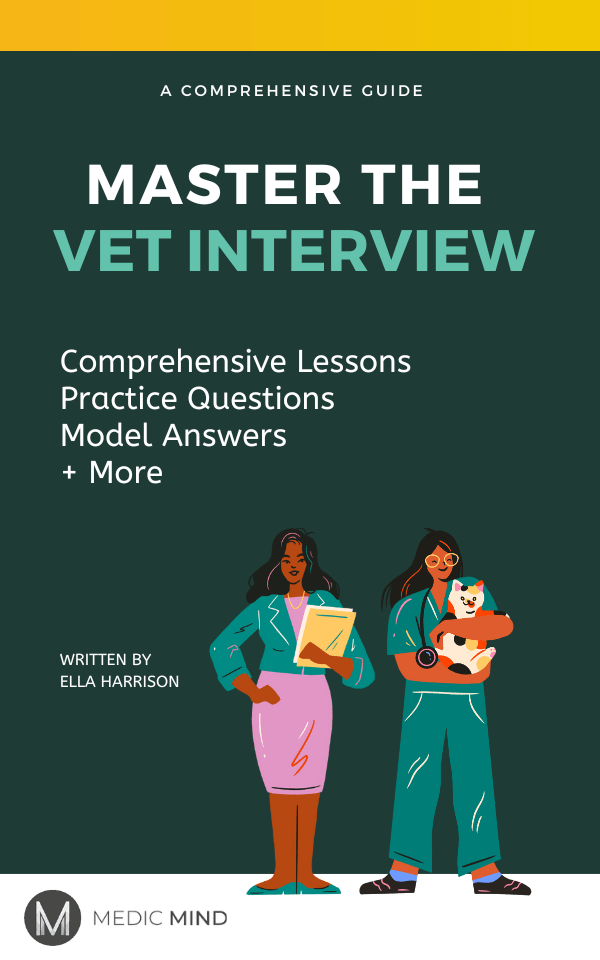Loading...


How to Prepare for Veterinary Interview?
First of all, congratulations on your vet school interview offer
Receiving your vet school interview offer is such a great day and another step on the way to becoming a great vet. Woohoo! Although this is a time to get excited, it’s also a great opportunity to pick up some handy interview tips. Preparation is key to smashing your vet school interview and showing your vet school why you deserve a place. Do keep reading, I’d love to share my tips with you for how to prepare for a vet school interview.
What might they ask me?
But first, before I can share my secrets with you, let’s just recap on what sort of question categories that you could be asked at your interview;
- Ethics
- Role Play
- Anatomy
- Topical Issues
- Work Experience
But what are the answers to the questions?
Okay, so I know what they might ask me about, but the topics are so broad, I hear you say! And oh yes they are! But the big big similarity between the topics is what? YOU! It is you that answers the questions and in doing this you show the university how you can think logically and apply your knowledge. Yes, of course your answers are important, but how you get to your answers is so much more than about being right or wrong.
Here’s my top tips on how to prepare for a vet school interview- Enjoy!
Vet School Interview Tips: Number 1- Explain your reasoning
The whole point of the interview is for the university to see how you think- so show them! The interviewers will ask you questions to understand how you come to your conclusions, how you can apply your knowledge and how you can justify your answers. If you explain every decision that you make, the examiner can sit back in their chair and go “Yes, yes yes! Give this student an offer!”
Let’s have a look at an example showing how you can achieve this;
If the interviewer asks what the organ is that they are showing you, you could respond in two ways.
- “The organ is the liver”
This answers the examiner’s question but doesn’t expand on why. The examiner will then have to ask your more questions to understand why you think in this way.
- “The organ is the liver because it is dark in colour, has a smooth surface with some rounded edges. I can see that this structure also has flappy bits, which might be the liver lobes.”
This shows the examiner your logic- great! This also puts you in control of the conversation, meaning that you give answers before they have been asked and means that you can guide the conversation towards things that you are comfortable to talk about.
Kickstart your Veterinary Interview Prep!
Vet School Interview Tips: Number 2- Learn the detail of your personal statement
This is such a good detail to include in your plan of how to prepare for a vet school interview. The vet school wants to know what you know, not what you don’t! You’re not expected to be a vet before vet school! You have provided each university with a copy of your personal statement, and this gives them a little insight into what you have learned from your experiences so far. To help you out, the examiners like to ask questions on what you have learned, to give you the best shot at answering them confidently.
Here’s an example showing how you can wow the examiner;
If the examiner asks you about your time that you spent in a vet clinic you could say;
- “I spent lots of time watching the vets give animals vaccinations.”
This is something that most people do and doesn’t show that you have learned anything from your experience. This also doesn’t make you sound that interesting. The examiner has to ask you another question to try and draw more answers out of you.
- “I spent lots of time watching puppies have their first vaccinations. I know that one disease puppies are vaccinated against is Canine Parvovirus Disease. I think that this causes the puppies to vomit and have severe bloody diarrhoea if they get infected. The puppies are vaccinated at 8 and 12 weeks old.”
This answer shows that you have researched further into what you have seen. A great way to get your veterinary offer is to show that you are keen and want to learn!
Example questions are a great way to learn! You can find 20 practice questions here https://www.medicmind.co.uk/medicine-ucas-guide/top-vet-interview-questions-you-should-be-prepared-to-answer/
Vet School Interview Tips: Number 3- Smile!
This sounds so obvious, but smiling ticks a box that the interviewers are looking for. Academic knowledge and correct answers are great, but you will need so much more than this to become a good vet. The interviewer’s want to see how you cope when put under pressure. Interview days are stressful for anyone, so take this as an opportunity to show how well you can do. Smiling shows the examiner that you are enjoying what you are talking about and you are keen, but what else? It shows that you are not worried about the pressure (eventhough you might be a little nervous!) and that you are determined to enjoy the interview. These are great qualities of a future vet!
Vet School Interview Tips: Number 4- Prepare for the obvious!
If you’re applying to vet school, the university will want to know why! They want to know what makes you want to be a vet and what makes you want to go to that specific university. Linking this with your experience and any extra research that you have done will make you stand out amongst the crowd.
Vet School Interview Tips: Number 5- Stay up to date on key veterinary issues
There will always be so many topical issues in veterinary. These range from the shortage of vets to the breeding of brachycephalic dogs. If you’re aware of some of these problems and would feel comfortable to talk about them, the interviewers will recognise how keen you are. They’ll love it! And you never know, you might learn something new too. The Vet Record is a great online resource for this.
Vet School Interview Tips: Number 6- Think about the question carefully
Each question that you are asked is designed to help the university to get to know you better. If you can identify what the university wants to know, you get the opportunity to tick their box and show them that they need you in their vet school. Make them desperate to have you!
Vet School Interview Tips: Number 7- Show your best self in the group task
The whole point of a group task is to identify how well you work with others, so show them! This type of station tests your communication skills with the other applicants. One great way to wow the interviewers is to start by introducing yourself to the group and asking everyone else to introduce themselves. Using everyone’s names show how attentive you are and how you want to work as a group to get to the solution.
Vet School Interview Tips: Number 8- Reflect on your previous experiences
Work experience is a huge part of getting into vet school and the interviewers love to ask you about it. If you can learn a case that you saw in practice- great! You could take this one step further by reflecting on what you have seen and discussing what did and didn’t go well. This shows that you have engaged with your experiences and how you want to improve- a very very important quality.
Vet School Interview Tips: Number 9- Dress appropriately
The interview isn’t a fashion show! There is definitely no need for a new ball gown! You want to show yourself professionally, but it’s okay to show a bit of your style too! Avoid the hoodies and trainers, go for something on the smart-casual to smart spectrum. Each university normally advises students what to wear, so go with that.

Vet School Interview Tips: Number 10- Practice, practice and practice!
You really can’t do enough of this. Most people worry about having a blank and not knowing what to say. This is completely understandable and one way to get rid of those nerves is to go through some example questions. Once you get into the swing of things, you should find yourself relaxing and opening up.
Still nervous about your vet school interview? Completely understandable! To give students a little more support and confidence, Medic Mind offers Veterinary Interview Tutoring sessions and a Veterinary interview crash course. These are great fun and give you the best preparation for your interview.
And so…
Interview days are daunting for everyone. Knowing how to prepare for the vet school interview sets you one step ahead of everyone else. So remember- explain your reasoning, learn the detail of your personal statement, and smile! It’s up to you to show the universities that you should get a place. Go and get it!
In need of more advice? The Association of Veterinary Students provides a great guide on getting into vet school. https://www.avsukireland.co.uk/getting-into-vet-school
If you want to practice these with a current vet student, make sure to check out Medic Mind’s Veterinary Interview 1-1 Tutoring below where you can get personalised coaching.
Frequently Asked Question
→What type of questions can I expect in a vet school interview?
You can expect questions about your academic background, veterinary experience, animal handling skills, problem-solving abilities, communication skills, and ethical values. The interviewer may also ask you about your motivation for becoming a veterinarian and your career goals.
→What should I wear to a vet school interview?
Dress professionally and conservatively. Wear a suit or business attire in neutral colors such as black, navy, or gray. Avoid flashy jewelry, heavy makeup, and strong perfumes or colognes.
→How can I research the vet school before the interview?
Visit the school’s website and read about its academic programs, faculty, research opportunities, and extracurricular activities. You can also talk to current students or alumni, attend a virtual information session or open house, and follow the school’s social media accounts.
→What are ethical interview questions for vet school?
When preparing for a vet school interview, it’s important to be aware of ethical considerations and to understand the types of questions that are appropriate to ask. Here are some examples of ethical interview questions for vet school:
Can you describe a situation in which you faced an ethical dilemma related to animal welfare? How did you handle it?
What do you think are the most pressing ethical issues facing the veterinary profession today, and how do you plan to address them?
Can you give an example of a time when you had to balance the needs of an animal with the needs of its owner or caregiver? How did you navigate this situation?
How do you plan to balance your ethical obligations to your patients with the business demands of a veterinary practice?
How do you stay informed about current ethical guidelines and best practices in veterinary medicine, and how do you ensure that your actions align with these principles?
It’s important to note that ethical questions should not be used to test the applicant’s moral character or to put them in a difficult or uncomfortable position. Rather, ethical questions should be used to assess the applicant’s understanding of ethical principles and their ability to apply them in real-world situations.
→How can I demonstrate my passion for veterinary medicine in the interview?
Highlight your relevant experiences and achievements, such as volunteering at an animal shelter, working as a veterinary assistant, or conducting research on animal health. Show your knowledge of current issues and trends in the field and explain how you plan to contribute to the veterinary profession.
Related Articles
Related links
MMI interview preparation with our live interactive day and comprehensive feedback
Personalised 1-1 lessons, tailored to your interview preparation
Covering 8 interview topics, with model answers, live MMI analysis and hot topics





Was this article helpful?
Still got a question? Leave a comment
Leave a comment